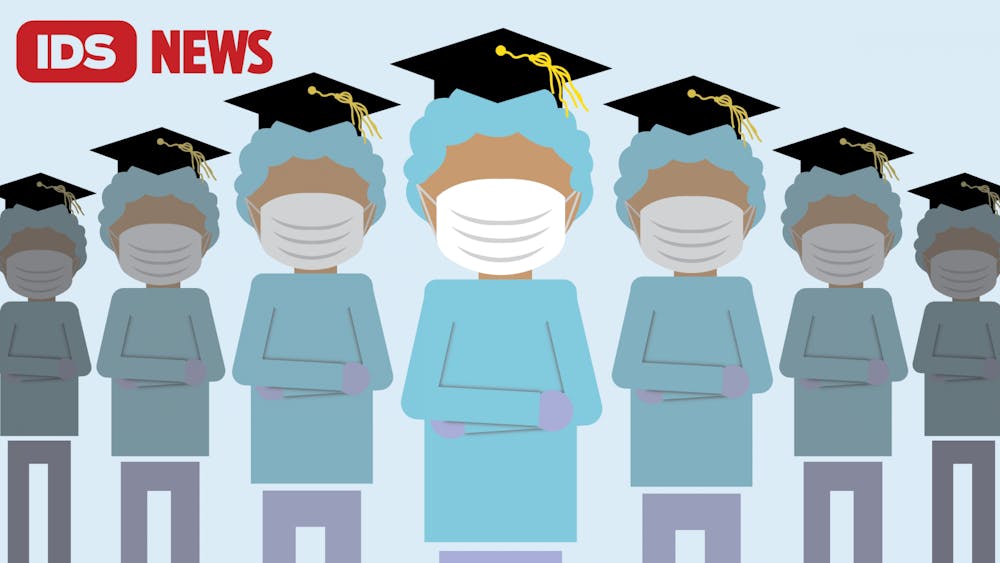Gov. Eric Holcomb issued an executive order March 30 allowing fourth-year medical students to apply for a temporary state medical license once they complete all of the coursework for their degree. At a Friday meeting, IU trustees approved the request for 135 IU School of Medicine students to graduate April 15 to join the healthcare workforce.
David Vega, an IU School of Medicine fourth-year medical student, did not hesitate to sign up to graduate early. He’ll start a job at Richard L. Roudebush VA Medical Center in Indianapolis post-graduation before he embarks on his residency. He’s come a long way from mid-March, when a raging fever and persistent fatigue halted his medical career.
The emergency medicine student contracted COVID-19. He contracted the virus early March after working in Africa, getting it somewhere amid a whirlwind of airports and Florida gatherings.
"No one is immune," Vega said.
Vega has recovered, and is running 5Ks and attending online medical bootcamps. He said he predicts he'll feel less anxious around patients now that he’s had the virus, and he's excited to get out in the field.
Vega’s classmate Quinton Nannet, also a fourth-year IU medical student going into emergency medicine, has already completed his final exams. He will obtain a temporary license and begin work at Sidney & Lois Eskenazi Hospital if needed. He said the hospital is not in need of extra help now, but he is prepared in case the situation changes.
Nannet’s fiancee Emily Deremiah, a pharmacy resident at an Oklahoma hospital, gives him updates from her work. He said she was alarmed recently when a man with the coronavirus in her hospital rapidly deteriorated after returning from a Florida vacation.
“He wasn’t much older than us and was just as healthy,” Nannet said.
Nannet, who chose to study medicine after watching his sister grow up with Periventricular Leukomalacia, said he feels lucky to start working in this unprecedented time.
“As a doctor, you’re constantly wanting to take on more responsibilities, wanting to do more to help people,” Nannet said. “Now’s the chance.”
Halley Staples, a fourth-year IU med student and the daughter of a midwife, is entering a residency program where two doctors are already sick with the coronavirus. She said she isn’t afraid.
“There’s risks to everything,” Halley said. “But this is what I came to med school to do.”
Staples, who will be an OB-GYN, said one reason she was drawn to the profession was because she wanted to advocate for women’s rights. She said it’s outrageous states are exploiting the epidemic to pass anti-abortion legislature.
“This was the perfect time to push an agenda waiting to be pushed for a long time,” she said.
Staples said the weekly hours for her future residency will include 14 days on-duty in a row, totaling about 160 hours of work combating the pandemic without a day off. The two weeks on-duty will be followed by two weeks off to self-isolate with Squid and Dory, her cats.
Her start date for her residency at Washington University in Saint Louis is in early June rather than July, so she is not planning to graduate early and get a temporary license. She said she is seeking volunteer opportunities while she waits until she can start.
Caitlyn Waldrop, a IU fourth-year medical student and triathlete, begins her residency in general surgery at University of Texas Southwestern Medical Center too soon to get a temporary license as well. She said she wishes she could, and she plans to spend her time getting extra prepared for June.
“I want to show up on day one ready to dive in and give someone else a break,” she said.
She said she is exercising, practicing her surgical knots and studying textbooks to prepare.
Waldrop said the pandemic has taken a toll on her emotionally. Always hungry for more answers, she said she followed the news too closely at first, and it negatively affected her mood.
She limits her daily intake to the CNN daily newsletter, Centers for Disease Control and Prevention updates, news alerts on her phone and evening news broadcasts.
“It’s easy to read one person’s account and be terrified,” Waldrop said. “It’s important to know the facts.”
Waldrop said she is concerned for people under straining socioeconomic circumstances. She said she hopes this pandemic sparks immediate action to help those who can’t afford healthcare.
When Waldrop begins her residency, she’ll work six or seven days a week for 49 weeks in a year. She said she is prepared for the grueling hours.
"Eighty hours a week on-duty goes by much quicker when you love what you’re doing,” Waldrop said.




